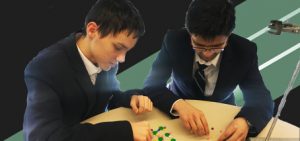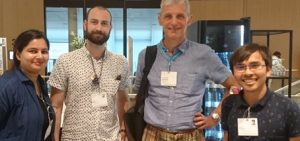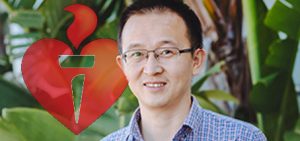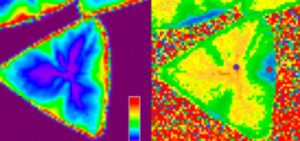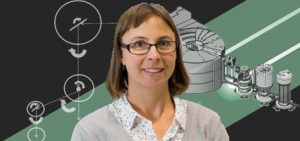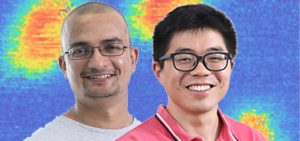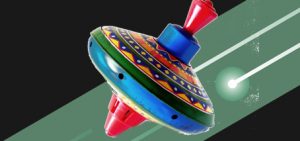FLEET News
—by Cecilia Bloise, Node Coordinator, UNSW There’s nothing like a strong dosage of outreach to get the ‘cats out of the box’ into the public sphere. The FLEET Centre of Excellence invests significant resources into science-outreach, aimed to inspire stronger engagement with science across all levels of the community, from primary and secondary school students to the broader population. Beyond …
A source of embarrassment to some, or pure comedy to others, flatulence and the gases of the intestines are increasingly seen as playing an important role in our digestive health. A paper led by UNSW Sydney and published in Nature Reviews Gastroenterology & Hepatology has examined all available literature on gastrointestinal gases, their interactions with the microbiome of the gut, …
FLEET is currently helping to run a Year 10 ‘Future electronics’ course in partnership with John Monash Science School, Victoria. As well as covering the history of semiconductors and computing, and introducing students to Moore’s Law, the course will also be most students’ first introduction to quantum science, and will be Australia’s first introduction to superfluids and topological materials at …
—by Dr Shaun Johnstone (Monash University) and Dr Tapio Simula (Swinburne University of Technology) One of the first things we learn about the absolute temperature scale, measured in degrees Kelvin, is that it’s impossible to get temperatures below Absolute Zero. But in a recent pair of FLEET studies into turbulence, researchers were working in a regime of precisely that: negative …
Three FLEET ECRs were fortunate to attend the 69th Nobel laureate meeting in Lindau, Germany, forming an impressive 30% of Australia’s ten-person delegation elected and led by the Australian Academy of Science. This year’s meeting focused on physics, and a number of senior FLEET were amongst the laureates. Our ECRs were pleased to connect with Wolfgang Ketterle, William Phillips, and …
First observation of excitonic insulator New exotic state was first predicted in 1960s A University of Wollongong / Monash University collaboration has found evidence of a new phase of matter predicted in the 1960s: the excitonic insulator. The unique signatures of an excitonic insulating phase were observed in antimony Sb(110) nanoflakes. The findings provide a novel strategy to search for …
FLEET Associate Investigator Professor Yuerui Lu (ANU) has been named a Heart Foundation Future Leader Fellow. The innovation of Professor Lu’s research, which focuses on the next-generation high-throughput 3D microscopy for cardiovascular imaging, was also recognised by the Foundation’s Paul Korner Innovation Award. This project aims to demonstrate proof of the concept for a novel high-throughput 3D microscope using ultra-thin, …
Oxidation of monolayer WS2 in ambient requires exposure to light, and keeping samples in darkness can protect from oxidation Routine exposure to room lights (days) or light microscopes can cause significant oxidation, suggesting wide reaching implications for current and future studies of monolayer S-TMDs To protect monolayer semiconductor transition metal dichalcogenides (S-TMDs) from oxidation, they must be entirely shielded from …
Congratulations to FLEET’s outreach officer Dr Dianne Ruka, winning the Award for Exceptional Service to the Faculty of Science at Monash University. Dianne leads the education and training missions for FLEET across all seven collaborating universities, supporting staff and students across both Monash’s Science and Engineering Faculties, through science outreach programs. Since joining FLEET in 2017, Dianne has combined her …
Welcome to Kirrily Rule (ANSTO), who joins FLEET as a new Partner Investigator. Dr Kirrily Rule is an internationally-recognised leader in understanding low-dimensional and ‘frustrated’ magnetic materials. At ANSTO, she is one of three instrument scientists responsible for ANSTO’s triple-axis spectrometer TAIPAN , which provides highly detailed information of collective motions of atoms in solids, including phase transitions. Within FLEET, …
FLEET’s goal is to achieve 30% representation of women at all levels across FLEET. To begin to move towards this goal, we needed innovative approaches that would allow us to begin ‘shifting the dial’. One innovative initiative that has met with success was FLEET’s new women-only Fellowships, offered in multiple locations, and across all fields of study in the Centre. …
FLEET welcomes three new research fellows, who will be working in diverse roles across the Centre: Dr Semonti Bhattacharyya (Monash) Dr Peggy Qi Zhang (UNSW) Dr Iolanda Di Bernardo (Monash) The three new positions have been filled via the Women in FLEET fellowship, which forms part of FLEET’s mission to create workplace diversity and retain female scientists within STEM. Dr …
Welcome to Francesca Iacopi, who joins FLEET as a Scientific Associate Investigator. Professor Iacopi has over 20 years’ industrial and academic research expertise in semiconductor technologies, and currently leads Communications and Electronics Engineering at the University of Technology, Sydney. Francesca’s work at UTS translates scientific advances in nanomaterials and novel device concepts into implementable technologies. Within FLEET, she will investigate …
In a paper released today in Science Advances, UNSW researchers describe the first observation of a native ferroelectric metal. The study represents the first example of a native metal with bistable and electrically switchable spontaneous polarization states – the hallmark of ferroelectricity. “We found coexistence of native metallicity and ferroelectricity in bulk crystalline tungsten ditelluride (WTe2) at room temperature,” explains …
• RMIT–UNSW collaboration combines theory, experimental expertise • ‘Spintronic’ applications promise faster, more efficient computing • New magnetic properties of 2D Fe3GeTe2 (FGT) discovered A theoretical–experimental collaboration across two FLEET nodes has discovered new magnetic properties within 2D structures, with exciting potential for researchers in the emerging field of ‘spintronics’. Spintronic devices use a quantum property known as ‘spin’, in …



